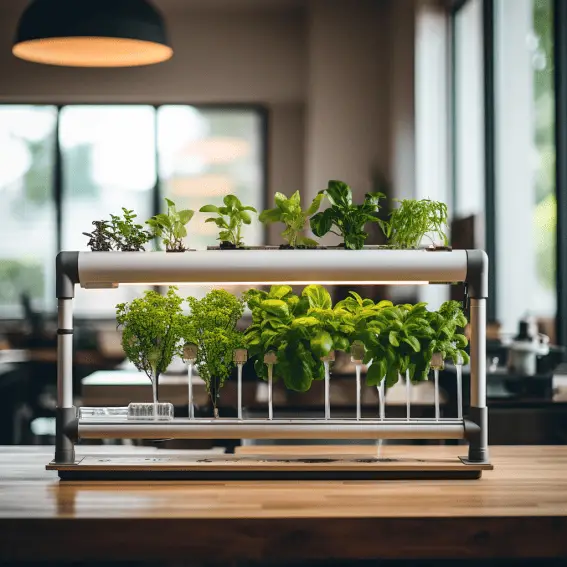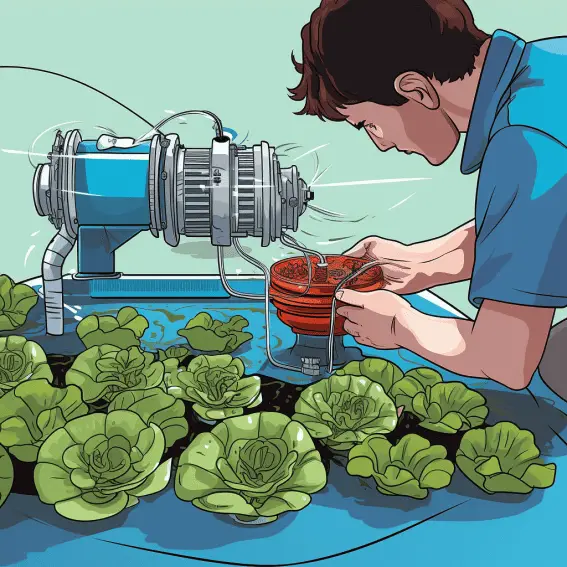Well howdy folks! If you’ve gotten your hands dirty with hydroponic growing, you know a good water pump is the heart of the whole operation. It keeps those plant babies happily fed and nourished. But like any equipment, pumps need a little TLC and maintenance to keep everything flowing smoothly.
But if you still don’t have water pump and need help in hydroponic supplies such as selecting the water pump, then check out the article.
So grab yourself an iced tea and let’s sit a spell while I walk you through some key tips for maintaining your hydroponic water pump. Whether you’ve got a submersible model or external kind, a few simple habits will have it humming along beautifully for seasons to come. Preventing problems now saves a heap of headache down the road. So put your feet up and lend me your ears, partners! This is useful knowledge for any hobby farm grower.
KEY TAKEAWAY
What should you know about maintaining your hydroponic water pump?
Regular maintenance of your hydroponic water pump is crucial for ensuring optimal nutrient delivery, preventing clogs, and promoting healthy plant growth. By following simple maintenance routines, you can maximize the efficiency and longevity of your hydroponic system.
Cleaning and Maintaining Submersible Hydroponic Water Pumps
If you’ve got a submersible water pump, keeping it in tip-top shape takes some TLC but avoids major headaches. Let’s chat about properly cleaning (1) and maintaining these fully submerged pumps. A well cared for unit will keep your nutrient solution flowing happily to roots for seasons to come!
Now a thorough but gentle monthly cleaning removes any gunky buildup in the impeller, motor or intake strainer. Unplug the pump first, then lightly scrub deposits away. Be careful not to damage any internal parts! Rinsing well in fresh water prevents mineral deposits over time.
Replacing seals about annually keeps things leak-free. And checking that the flow rate hasn’t decreased every 6 months lets you spot potential issues brewing. If needed, making adjustments to valves or tubing can restore full flow. Preventing problems sure beats dealing with ‘em down the road.
Lastly, don’t forget to inspect strainers and check valves for cracks that could lead to motor damage from debris. Doing a test run monthly in a bucket of plain water lets you check function and spot trouble. A little TLC goes a long way for submersible pumps!
Tips for Proper Hydroponic Pump Maintenance

Keeping your water pump in proper working order is mighty important for growing happy plants. Let me share some key pump maintenance tips so you avoid headaches down the line. (2)
First, inspect all tubing and pipe connections regularly for leaks or blockages. Tighten any loose fittings and clear out any gunk clogging things up. You want uninterrupted flow to roots! Also examine outlet screens and pre-filters for debris buildup which can reduce pressure.
Giving the pump a scrub with cleaning solution every month removes mineral deposits and salt buildup. Rinse very thoroughly after cleaning. Also change seals annually to prevent leaks or issues.
Finally, test run it regularly to ensure the flow rate and pressure haven’t decreased over time. Catching problems early allows for easy fixes. Following these tips will keep your pump humming along smoothly for seasons to come! Let me know if you have any other pump care questions, partners!
Troubleshooting Hydroponic Water Pump Issues
Even with proper care, water pump problems can sometimes crop up. But don’t fret – most issues can be quickly diagnosed and fixed with a few troubleshooting tips. Let’s chat about it!
If your pump is making loud noises, the internal impeller is likely clogged or damaged. Carefully take it apart and remove any debris blocking the impeller. If no debris is present, the impeller itself may need replacing.
If water flow is reduced, check for kinks in hoses first, then examine the outlet fittings and pre-filters for gunk buildup. Use a pipe brush to clear out blockages. Checking pump valves for correct settings can also get things flowing right again.
If leaks occur, re-tighten any loose tubing connections and examine seals for wear and damage. Replacing worn seals annually prevents most leaks. And keeping the pump free of mineral deposits reduces strain on seals over time. A little TLC prevents most problems!
Sizing and Selecting the Right Hydroponic Water Pump
Choosing the correctly sized water pump for your system is mighty important to keep those plants happy. Let’s chat on factors to consider when selecting a pump.
First, determine the flow rate needed based on the size of your reservoir and piping. Larger systems need more gallons per hour for adequate circulation. Also factor in “head height” from reservoir to grow bed when sizing the pump. More vertical distance requires higher pressure.
Finding the right balance of flow and pressure prevents issues like leaks or starved roots. Buying a unit sized for the expandability of your system avoids having to upgrade later.
Consider energy use too – more power equals higher electricity costs. And if noise matters, compare decibel levels between pump models and types like submersibles or inline. Selecting the properly sized, efficient pump saves headaches down the road! Let me know if you need help with the math or have any other questions!
Understanding Hydroponic Water Pressure Problems
Maintaining proper water pressure is essential for delivering nutrients to roots. But sometimes issues pop up. Let’s chat about potential causes and solutions so you can get things flowing right again.
If pressure drops, restricted pipes or tubing are often the culprit. Check for kinks or clogs from sediment, algae or plant matter buildup. Clean out or replace affected lines. An incorrect pump valve setting or worn impeller seal can also reduce pressure, so inspect those.
Conversely, excess pressure can cause leaks or dripping. Confirm the pump isn’t oversized for your system. Adjusting valves and restricting tubing size can reduce too much pressure. And make sure head height is calculated correctly from the reservoir surface to grow beds. Reconfiguring piping might be needed.
Getting the right pressure balance takes some trial and error but avoids big headaches! Tell me about any other water flow issues you have and we’ll troubleshoot together.
The Importance of Regular pH and EC Checks
Monitoring the pH and EC (electrical conductivity) of your nutrient solution is critical for healthy plants. Let’s look at why regularly checking these levels matters.
The pH indicates the acidity or alkalinity of the water. If pH drifts too high or low from the optimal range, it can affect nutrient absorption. Several issues like slow growth or spotty leaves can result.
EC measures dissolved salts like fertilizer compounds. Too little fertilizer causes deficiencies while too much burns roots. Keeping EC in the ideal zone prevents problems.
Testing and adjusting pH and EC daily or weekly takes just minutes but avoids headaches later. It ensures your plants get perfectly balanced “meals” for thriving growth. Don’t rely on guesswork – accurate monitoring makes the difference! Let me know if you need help interpreting results. Happy growing!
Extending the Lifespan of Your Hydroponic Pump
Your water pump is a critical component, so extending its lifespan through proper care pays dividends. Let’s look at tips to maximize the usefulness of your pump.
Regular cleaning and maintenance to remove mineral buildup prevents strain on parts like seals and impellers. Catching even small leaks early keeps things running smoothly. Testing flow rate and pressure monthly allows you to spot potential issues brewing.
Operating the pump within the recommended guidelines for factors like flow, pressure, runtimes and duty cycles reduces wear. Periodic inspections let you replace worn parts before they fail. And following manufacturer maintenance tips specific to your model goes a long way.
With good care, quality pumps can operate reliably for many seasons! The small time investment needed to maximize lifespan avoids costly replacements or emergencies down the road. Let me know if you have any other pump longevity questions!
Hydroponic Air Pumps vs. Water Pumps: Choosing the Right Option
When setting up your system, selecting the right pump for the job matters. So what’s the difference between air pumps and water pumps? Let’s discuss the pros and cons of each.
Air pumps deliver a steady supply of oxygen via air stones in your reservoir. The bubbles prevent water from becoming stagnant. But air pumps don’t actually move the water like circulation pumps do.
Water pumps continuously deliver nutrient solution to plant roots and drain excess back to the reservoir. This brings fresh nutrients and oxygen. Submersible water pumps sit immersed in the tank.
For small hydro systems, just an air pump may suffice if water movement isn’t critical. Larger systems usually benefit from both air and water circulation pumps working together for optimal conditions. Assess your needs and choose wisely!
Conclusion
Well there ya have it, friends! With just a little regular care and attention, your hydroponic pump will keep those nutrient-rich waters pumping to your plants without a hitch. Remember to check connections, filters and lines for buildup or wear. Clean it thoroughly but gently. And give it a test run on a schedule to spot potential issues before they become headaches.
Following these maintenance tips might take some time up front, but it sure beats the alternative of an emergency repair! A well-functioning water pump means thriving plants and bountiful harvests. So take it from me and treat your pump right. Your plants and your sanity will thank you!
Frequently Asked Questions
What Causes Low Water Pressure In Hydroponic Systems?
Issues with water pressure can definitely cause headaches in hydroponic setups. Let’s chat on what might be causing low flow to your plants.
If your pump pressure drops, restricted pipes or tubing are likely the culprits. Check for kinks and clean out any gunky buildup clogging things up. Also inspect the pump valves and impeller – incorrect settings or wear here reduces pressure.
Another cause could be incorrectly sized or positioned piping. If the pump is having to push water much higher than the reservoir, more “head height” requires higher pressure. Reconfiguring pipes can help.
Getting your water pressure dialed in just right may take some trial and error. But avoiding those headaches down the road is worth it for happy plants! Let me know if any other issues pop up and we’ll get them fixed right quick.
How Often Should Hydroponic Water Pumps Be Cleaned?
Keeping your water pump free of gunk is mighty important. But how often is regular cleaning needed? Generally every 3-4 weeks works well.
Giving it a scrub removes any mineral deposits, sediment and salt buildup that can strain the motor and impede flow. Be sure to rinse super thoroughly after cleaning.
More frequent cleaning may be needed for pumps pumping nutrient-rich water, versus just plain water. And depending on your reservoir size and plant load, monthly cleanings might be best to prevent pump problems.
The key is not allowing debris, algae or calcium deposits to build up over time. Catching issues early keeps everything running smooth! Let me know if you have any other hydroponic pump cleaning questions!
How Can I Increase Oxygen Levels In My Hydroponic Reservoir?
Maintaining proper oxygen levels in your reservoir is mighty important for healthy roots. There are a few easy ways to increase it if needed.
First, try running an air pump with air stones to generate bubbles – this agitation and surface movement introduces oxygen. Running your water pump 24/7 also keeps things circulating.
You can add more air stones to the reservoir if needed. And be sure your water pump flow rate provides adequate circulation for the reservoir size. Cooler water temperatures also hold more oxygen than warm.
Finally, change nutrient solutions regularly to provide fresh oxygen versus stagnant old water. Test and monitor oxygen content with a meter to dial in proper levels! Let me know if you have any other questions!
What Are Signs Of A Failing Hydroponic Water Pump?
Good question, friend! There are a few key signs that your faithful water pump may be on its way out and need replacing. Being able to spot these early helps avoid bigger issues down the road.
If flow rate starts decreasing, your pump’s impeller or motor is likely wearing down. Loud noises coming from the pump can also indicate a problem brewing.
Dripping or leaking around the tubing connections or bottom seal is another red flag of wear. Discoloration or clouding of the pump body itself can mean corrosion and breakdown of parts.
Catching pump problems quick lets you take preventative steps before failure happens. But even the best maintained units eventually require replacing. Just look for the signs so it doesn’t catch you unprepared! Let me know if any other pump questions come up!
References
- https://www.htgsupply.com/how-to-cleaning-your-submersible-hydroponic-water-pumps/
- https://floraflex.com/default/blog/post/how-to-maintain-your-hydroponic-reservoir
Related Articles
- https://tophydroponicgarden.com/selecting-a-hydroponic-water-pump/
- https://tophydroponicgarden.com/water-pumps/
- https://tophydroponicgarden.com/hydroponic-supplies/
Was this helpful?

Crystal Erickson is an agriculture enthusiast and writer with a passion for sustainable farming practices and community development. Growing up on a family farm in rural Iowa, Crystal developed a love for the land and a deep appreciation for the hard work and dedication required to make a farm successful.
After completing a degree in Agriculture and Environmental Science from Iowa State University, Crystal began her career as an agricultural journalist, covering stories and issues related to modern farming practices, crop management, and livestock production. She quickly established herself as a respected voice in the industry, known for her insightful reporting and thoughtful analysis.
Over the years, Crystal has written for a variety of publications, including Farm Journal, Successful Farming, and Modern Farmer, as well as contributing to several academic journals focused on sustainable agriculture and community development. Her work has been recognized with numerous awards, including the Iowa Farm Bureau’s Young Farmer Achievement Award and the National Association of Farm Broadcasting’s Farm Broadcaster of the Year.


